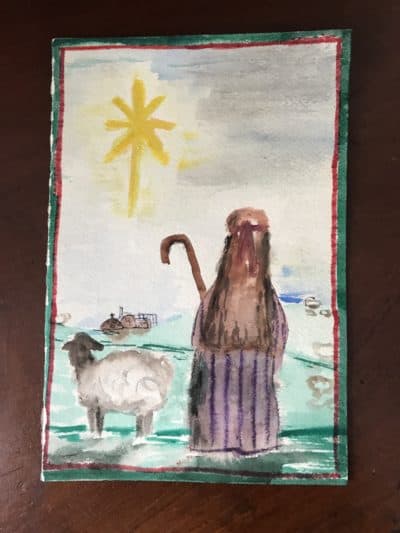Advertisement
Commentary
Finding The Sacred In A Non-Christian Christmas

It's Christmas Eve. I am 5 (or 8 or 10). My father has read "The Night Before Christmas" to my brother and me. We’ve hung our stockings and put out a plate of cookies, and now I’m lying in bed, awake, filled with a sense of wonder and anticipation, laced with a giddy sense of mystery.
He’s coming. That magical guy.
I speak, of course, of Jesus.
Wait! Don’t stop reading. This is not a piece about the true meaning of Christmas and putting Christ back in it, I swear. In fact, it’s sort of the opposite.
I didn’t grow up ultra-religious. My family attended the same congregational church that all four of my grandparents had, and we were quietly, politely, liberally Christian. No evangelizing or testifying. All very Connecticut.
Still, I definitely bought into the idea that Jesus was more than just a teacher with an important message of love and forgiveness; he was the son of God. For reals.
Did I believe that his mother was a virgin? (Once I knew what a virgin was, that is — I don’t think my Sunday school teacher, Mrs. Wilkinson, got into the specifics.) Did I think he actually came back from the dead? I think as I inched into tween territory, I had a hunch it was just symbolic. But I was nevertheless pretty certain that 1. Jesus was the son of God, savior, etc. and, 2. Believing in him was the best way to go.

So, for child-me, the build-up to Christmas was the world’s greatest twofer: There was the secular thrill of it — lights and decorations and cookies and that other magical guy — and the quieter thrill of the sacred: the hymns, the nativity scenes, the gospel according to Luke, and my steadfast belief that 2,000 years ago, almost exactly, an actual miracle occurred.
Hence me lying in bed, feeling (knowing!) that this was a majorly magical night. I could clearly imagine that quiet, cold night in Bethlehem — the stable, the star, the shepherds. The lowing and swaddling. O holy night, indeed.
As I got older, and got wise to the Santa thing, I still clung to the Jesus part. Not a bad consolation prize. We started going to our church’s candlelit Christmas Eve service, where my brother and I sang with the youth choir. My favorite moment was at the end of the service, when they dimmed the lights and rang the chimes — joyful descending scales, one after another, followed by a few bouncy arpeggios, one final downward cascade, grandly ritardando, and ta-da! Jesus is born anew in our hearts. It was beautiful.
Advertisement
But as I edged toward adulthood, my belief in the divinity of Jesus began to fade. I learned that the only reason we celebrate his birth in early winter is more about religious imperialism and syncretism (Poof! Your yule log is now a Jesus log!) than historical accuracy. I started to find spiritual meaning and moral wisdom in other places: Buddhism. Judaism. Shakespeare. Science. The notion that Christianity was the best and only way to believe became unacceptable to me.
I soon stopped considering myself a Christian. After a long hiatus from any sort of religion, I now belong to a Unitarian Universalist church. (“Church” being a bit of a misnomer.) It has the trappings of a mainline Protestant New England church, which I like, but none of the dogma. Jesus is just one of many great teachers whose words and deeds we contemplate. Buddha, Rumi, Emerson, Hillel, Martin Luther King, Mary Oliver, Pete Seeger or Maya Angelou are just as likely to make appearances in the readings or sermons.
I’m awed by Handel’s "Messiah," the smell of spruce, and my mother’s sour cream coffee cake on Christmas Day.
I still feel like I’ve got an affinity and an affection for Christian teachings. And I will never be able to bring myself to sing the sanitized, Jesus-free, inclusive UU versions of familiar hymns at Christmas and Easter: “Hark! The herald angels sing: songs of Hope to us they bring!” Nope. Sorry. I’m still singing “Glory to the newborn King.” Chalk it up to nostalgia, I guess.
But I do sometimes miss the pure faith of my childhood.
Still, I manage to find magic in the human realm, especially in December. I’m awed by Handel’s "Messiah," the smell of spruce, and my mother’s sour cream coffee cake on Christmas Day. George Bailey running down the main street of Bedford Falls and Ebenezer Scrooge dancing in his night clothes always get me choked up. And the fact that millions of human beings of various faiths, collectively, manage to find joy, beauty, and meaning in this season, in spite of all our differences, and in spite of everything that’s wrong with the world — it definitely merits rejoicing.
Amen.
